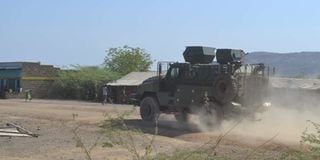Premium
Inside Kapedo: Where banditry and death gangs rule

Police use an armoured vehicle to conduct patrols in Kapedo during a security operation on January 19, 2021.
The mention of Kapedo, a shopping centre on the Turkana-Baringo counties border sends chills down one’s spine.
It evokes memories of stories of hundreds of people, including security officers, who have been killed in attacks.
Just 29 kilometres off the Marigat-Chemolingot road in Tiaty constituency, Baringo County, is the infamous centre.
Kapedo has been a death trap to civilians, public and private sector workers and security officers.
Heavily armed bandits kill, maim and loot as they please with no fear of repercussions.
So grave is the situation that few people dare venture into Kapedo without police escort, usually a contingent of armed officers – some ahead and others behind.
It is even more chilling for residents of Kapedo and its environs.
They are, as many of them say, trapped in their compounds.
Moving out, even just 100 metres away, could be a death sentence as armed men lurk in the bushes.
Kapedo is set on the foothills of Tiaty and Silale, where bandits emerge to unleash terror on hapless residents. The gullies and sunbaked rocks offer perfect covers.
As such, Kapedo is not a workstation for the faint-hearted.
Mr Harrison Kasitet, a teacher, told the Daily Nation that one can never fail to spot a gun at a church, school, hospital, river, barazas or any gathering.
“The firearms are there just in case bandits strike. During PE lessons or games in school, pupils prefer to play in the dining hall since that minimises the chances of being hit by a bullet,” Mr Kasitet said.
“Officials from the Ministry of Education execute policies online as they fear coming here. There is no sanctity of life here. It is a culture that is getting out of control.”
Anyone going to Kapedo must surmount fear and be prepared to endure the punishing terrain and the sweltering heat and dust.
An adrenaline rush is guaranteed as one takes the Kapedo-Lomole-Lokori-Lokichar road, security escort notwithstanding.
At Kapedo bridge, where many police officers have been killed in ambushes over the year, the magnitude of the danger lurking is evident.
The road meanders into a narrow deep open tunnel, with the top offering a vantage point for bandits.
“New teachers posted here plead with the employer to be sent elsewhere almost immediately,” said Mr Kasitet, who has served in Kapedo for three years.
Ms Evelyn Ekaudo, a resident, said insecurity is growing worse by the day.
“There is no public means of transport. Police vehicles help us get food from Marigat. One has even to be escorted to hospital or church,” she said.
“Homes are like graveyards. Survivors have lost limbs or are nursing serious lifelong injuries. Most Kapedo locals rely on relief food.”
Residents have thrown their weight behind the ongoing security operation.
Mr Morris Ekitela, another local, said even adults relieve themselves in the house as going out may be fatal.
“Almost all the victims were shot from behind, indicating the bandits follow us,” he said.
“Children cannot concentrate in class because of gunshots.”
Attempts by successive governments to end insecurity in Kapedo have borne little fruit, with politicians being accused of fanning the flames of bloodshed.
Climate change resulting in diminishing water resources and grazing fields has also aggravated communal violence.
Two weeks ago, Interior CS Kithure Kindiki announced a military/police operation in the North Rift.
At least 23 guns had been surrendered by the end of the amnesty period and two suspected bandits arrested last week.
In a brazen attack on Wednesday, dozens of armed men ambushed military and police officers in Kainuk.
Governors from the North Rift support the deployment of the military to the region even as they urge the government to develop the area.
Nandi Governor Stephen Sang said state agencies should initiate viable projects to tackle banditry.





